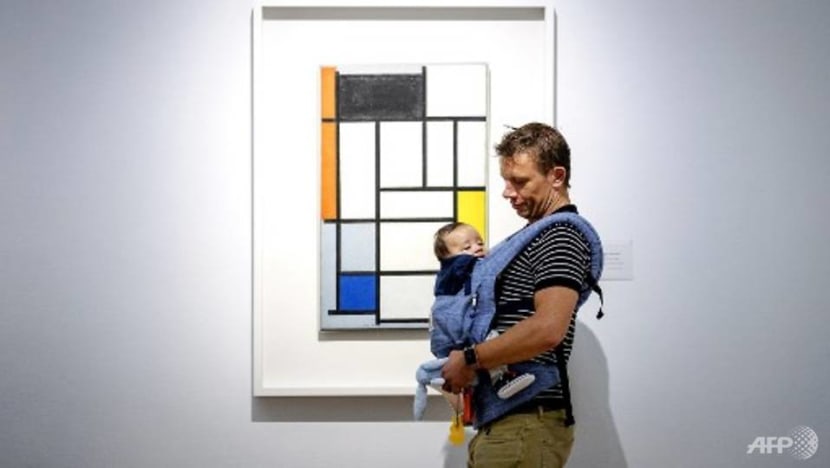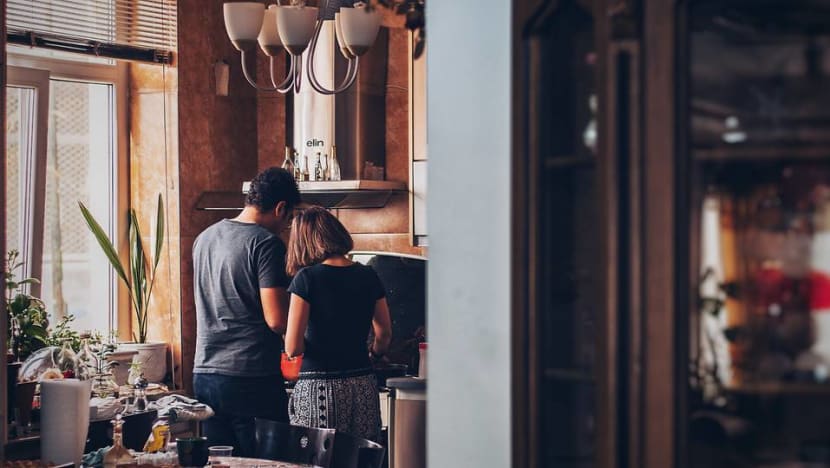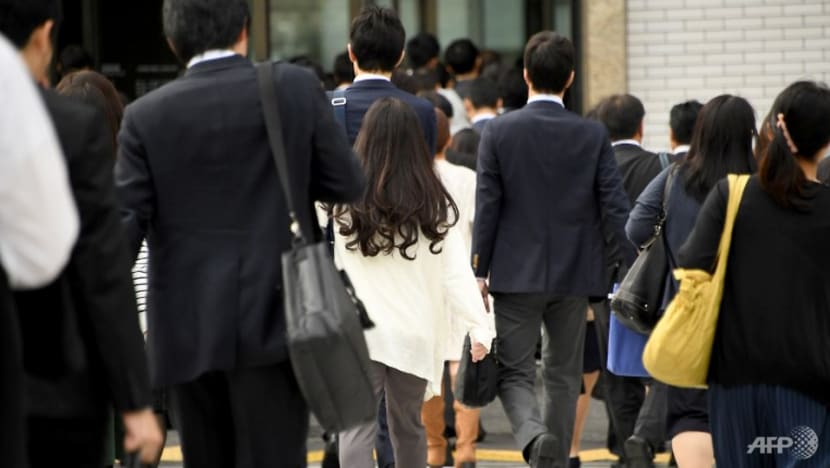commentary Commentary
Commentary: Gender equality is not just a 'women’s issue'
Gender equality is often framed as a responsibility of women, and that they ought to be more outspoken or assertive to climb the career ladder, but men too benefit from a more egalitarian society, says one observer from AWARE.

A father and his child at the first Baby Museum Tour in The Hague. (Photo: AFP/ANP/Robin van Lonkhuijsen)
SINGAPORE: According to a survey of 809 teenage boys that AWARE published last year (a collaboration with Ngee Ann Polytechnic’s Diploma in Psychology Studies programme), nine in 10 teenage boys reported facing pressures to be “manly” through experiences of harassment, bullying, teasing, social exclusion, and psychological and physical violence.
The most common forms of such pressure are being told to “man-up” and to “take it like a man”.
Many of us accept that this pressure which boys and men so regularly face is one way gender inequality manifests.
Yet when we actually talk about gender equality, many mention visions of greater female representation on boards and in government, or something basic, like women’s rights to education and work.
In thinkpieces and social discourse, gender equality is often framed as a responsibility that is largely in the hands of women and girls - that women ought to be more “outspoken” or “assertive” to get that promotion at work or muscle their way up the career ladder.

READ: Overlooked and underpaid, women must speak up and put themselves out there, a commentary
It too easily becomes a conversation about women’s “shortcomings”, and how women should behave, participate and contribute to right this deeply-entrenched imbalance.
Where are the men in this picture? It's clear that men also have a stake in gender equality.
Indeed men may have a greater responsibility to work towards it, as a group with collectively more power, influence and capital than women. But striving for equality won’t just improve society’s treatment of women and girls: Men, too, benefit.
CHALLENGE GENDER ROLES EARLY
A society that prioritises gender equality would start teaching boys and girls about the harms of gender roles early.
In Singapore, this can be done through implementing mandatory gender equality and comprehensive sexuality education in the school curriculum, which encourages young men and women to strive for more healthy and equal relationships.
If Singapore had such a curriculum in place, we probably would hear fewer stories about the gender stereotyping and sexist beliefs that young people are often subject to or reinforce – some examples in recent years include officially-distributed pamphlets telling young people about “female doublespeak”, and university orientation games that make light of sexual violence and gender-based violence.
These unhealthy messages would have less room to grow if young people are taught values of gender equality, respect and diversity, the same way they are taught racial and religious harmony in school.
MEN ARE ALSO AFFECTED
Boys and men are directly affected by narrow ideas about gender. Through the survey cited above, we found that 54 per cent of respondents have hit, punched, shoved or spat on another boy, while 74 per cent have experienced some form of physical violence.
“If (the bullied) said how they felt when someone insulted them, (the bullies) would say to “take it like a man” and “stop being such a girl”, one respondent said. Some reported how boys seen to be “weak” or “girly” were even sexually abused.
READ: ‘Stop being a girl and man up’: Boys face gender police, even as men’s roles change

The harms of pressures to conform seem fairly obvious. Everyone should be free to behave in ways that feel comfortable without the threat of violence. By reforming traditional ideas about gender, we can start to move away from real or implied threats of violence, and leave more than just overt gender-based violence behind.
After all, gender inequality doesn't only lead to violence - it restricts individual expression, contributes to economic inequality, and limits men and women's role in their households and communities, among others.
READ: Should a man be expected to earn more than his wife? A commentary
CAREGIVING SHOULD NOT BE ONLY A WOMAN’S RESPONSIBILITY
Let’s take the issue of caregiving in the family - a big part of many people’s lives in Singapore, especially with our ageing population. Myths about how women are more naturally nurturing and caring than men seem to shape our national policies.
For instance, mothers receive 16 weeks of maternity leave, while fathers receive only two weeks of paternity leave. Fathers are allowed to share maternity leave, though only up to four weeks.
Might this be the reason for why women assume a heavier caregiving burden?
According to Ministry of Social and Family Development’s survey of informal family caregivers of older adults, 60 per cent of caregivers were women.
The message is unfortunately loud and clear – childcare and eldercare remain primarily “women’s issues”. We see this translate into women’s inability to fully participate in the labour force, which result in their financial stability and livelihoods suffering.

78 per cent of prime-age working women who were out of the labour force two years ago in a survey by the Ministry of Manpower cited “family responsibilities” as their main reason for not working, compared to 9.6 per cent of men.
This ripples into old age: Women have 11 per cent less CPF savings in old age than men do, an analysis by the Central Provident Fund found last year.
READ: 'Super mums' have one simple request. Don't hinder them from returning to work, a commentary
A STRONGER, AND MORE EQUAL, SINGAPORE
What would Singapore look like if men were equal contributors to care and household labour? We would see greater economic growth, with women returning to the labour force after being freed up from unpaid care responsibilities that otherwise would fall entirely on them.
Dual-income households generally fare better in an expensive city like Singapore, so the pressure for men to be sole income earners is likely to lessen. In parallel, we would hopefully see national institutions improve at a greater pace to support this progress.
READ: Are women still expected to do most of the housework? A commentary

We already see a thirst for flexibility and more family-friendly policies in workplaces. There is a slow but growing normalisation of flexi-work arrangements among more progressive companies.
Employers are recognising their staff as more than just workers, but as individuals with care, domestic and personal responsibilities and needs as well. Employment policies that support family life and promote gender equality would enable all workers, including men, to better juggle work and care.
It's no wonder, then, that there are higher rates of retention and greater job satisfaction when employees feel like their contributions are supported and valued, beyond their office doors.
So it’s not just women who would benefit from initiatives like paid caregiving leave or equalised parental leave. Many fathers are starting to be more active parents, and healthy workplace allowances are encouraging egalitarian family structures, rather than one that is determined by gender.
After all, the underlying assumption that men are simply not interested in playing a bigger role in their children’s lives, or caring for their own family members, is unfair to men.
DON’T TAKE TOO LONG
It sounds like an all-around win, for men and women to strive towards gender equality. So what’s taking us so long to get there?
For gender equality to truly be achieved, much has to change. Individual attitudes and beliefs about gender need to be reformed, of course, but this would do little unless there are also accommodations made in our workplaces, educational institutions and communities.

Our laws and policies need to also address gender-based barriers – for instance, by increasing paid paternity leave to encourage equal caregiving.
Gender equality is not a pipe dream. But for it to be a reality, men need to recognise how gender inequality creates unfair, narrow and even toxic versions of themselves and their roles in society; and they need to see it equally as their responsibility, too.
And then they, as allies working alongside women, need to act.
Nabilah Husna is communications manager at AWARE.












